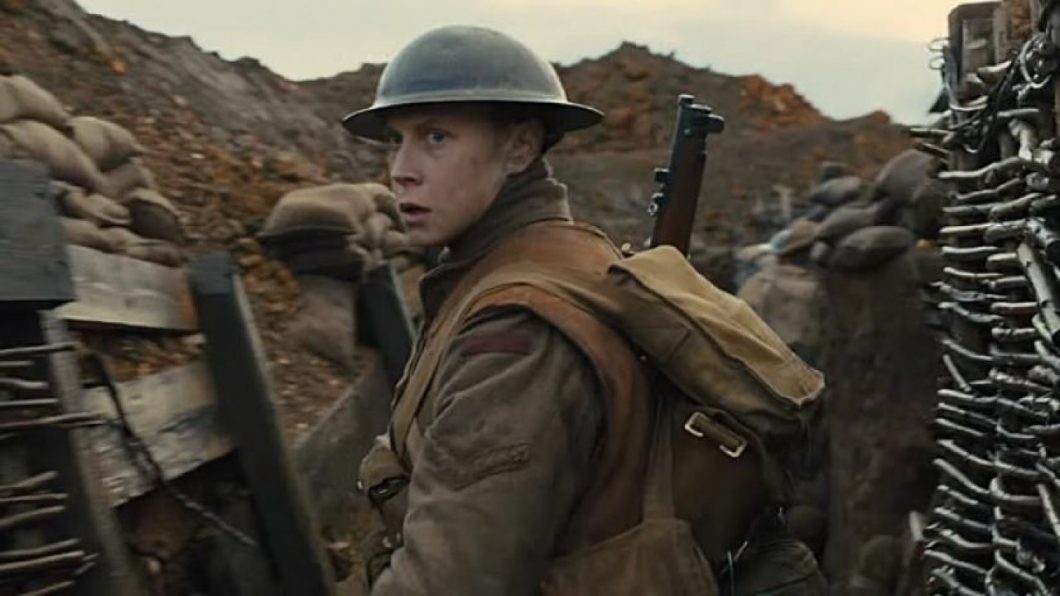The Wayfaring Soldiers of 1917
When does singing a nursery rhyme to a baby become antithetical to the good?
When a young man risking his life to save 1600 fellow soldiers pauses to reconnect with a gentle world he has not known since fighting at the Somme a year before. Every pause means other men edging to certain death.
The Germans have laid a trap for the British. Feigning a retreat, they have lured two British battalions into preparing an assault on the German lines believed to be collapsing. The reality is quite the reverse and the whistles ordering men over the top will blow in a matter of hours. Communications to the battalions are cut, but high command, knowing about the ruse, write out orders to stand down. Someone will have to carry the written orders to the battalions’ officers. The brother of one of those officers is tasked to sneak across enemy territory – the quickest route – to pass the orders along. Blake is a squaddie, fresh to warfare, but maybe he can save 1600 men, including his older brother. Every minute counts and this is one reason for the film’s kinetic energy. The other reason is the way the camera itself moves.
When Blake (Dean-Charles Chapman) is given the task, he happens to be with his friend Schofield (George MacKay). Like Blake, Schofield is young, but already a veteran of the Somme. He is roped into going along. The film opens with the two friends sitting in a meadow amongst wildflowers. Told to go and see the general, they stand, and the journey begins. Leaving the sunny meadow, the squaddies enter earthworks. It is a jarring moment, for the duo only take a few steps and then it is mud, munitions, dead men, and rats. Rats everywhere. You know it is a few steps only because you have walked those steps with them. The camera hovers about them, stepping as they step, and thus so does the movie-goer.
Behind enemy lines and running from a German soldier, Schofield sneaks behind a door, entering an enchanted world of calm: a young French woman (Claire Duburcq) caring for an orphaned baby in a sparse but well-ordered room. Seeing the gash in Schofield’s head, she takes a cloth and tends his wound: the first gentle touch he has experienced since before the Somme. The gesture lulls him, and a young man we have seen kill two men begins to sing a nursery rhyme to the baby.
A bell tolls. It is six in the morning. Like Cinderella, Schofield is jerked from enchantment, his pause to feel tenderness a temptation to let other men die. He races from the room, the camera races from the room, and we do, too.
Sam Mendes, the director of arguably the best Bond film, Skyfall, wrote (with Krysty Wilson-Cairns) and directed 1917. He is rightly being lauded for the ingenious ploy of having the camera move as the characters move. This device puts you right into their ordeal. It is a harrowing, but not gratuitous, journey into no man’s land.
Blake is already dead by the time Schofield sings to the baby. The film includes two moments when Germans betray trust. One when Schofield bumps into a German soldier in the dark. The soldier is even younger than he is. Covering the lad’s mouth with his hand, he motions him to stay quiet. A truce is offered: you live, I live. The lad nods, and Schofield takes his hand off his mouth. The lad immediately calls to fellow Germans. Schofield has no choice but to shut him up by throttling him. Before this encounter, Blake has been stabbed, dying in Schofield’s arms.
Two British planes hunt down a German plane. It crashes right by our duo. Plane in flames, they pull the injured pilot free. His life saved, he promptly stabs one of his benefactors. Schofield shoots him. It is another jarring moment: kindness in no man’s land gets you killed. The film is not nihilistic, however.
Mendes was inspired to write the film by stories told to him by his grandfather. Alfred Mendes, an important West Indian novelist, volunteered and was in signals. It is a nice touch in the film to see mixed in with the British Tommies Sikhs and Africans. This is not a cheap nod to our unhealthy race obsessed culture, but an acknowledgment that 3 million soldiers and laborers drawn from across the British Empire served in WWI.
Before going to the film, I wondered whether J. R. R. Tolkien would recognize the story. He would. It is the fashion for war movies today to dwell on PTSD, frenzied soldiers, nincompoop officers, futility. 1917 never mocks the courage of the young men nor the solidarity they show with their countrymen. There are no grand speeches about the absurdity of war, just men making the best sense of the duties they have taken on. Tolkien, himself a veteran of the Somme, never expressed disgust at the war or doubted its purpose. His sons went to war in WWII and Tolkien wrote to them encouraging them to do their duty.
Tolkien, a Catholic, would especially appreciate two religious scenes. The movie has only a few moments of humour, but one is provided by the cynical Lieutenant Leslie (Andrew Scott). Sick of the war, his encounter with the duo is all black humor. His cynicism breaks briefly, however. Taking them to the place in the British trenches where they can access a narrow passageway through the German line, Leslie sprinkles each with Scotch from his hip flask and gives them a benediction.
There is a second bit of singing. Emerging utterly exhausted from a river, having no idea where he is, Schofield weeps. He is at the end of his tether. Faint bars of a song are heard, and, in zombie-like fashion, he moves towards the music. It is the men he is sent to save. The British reserve is sitting in a copse, one of their number singing a nineteenth-century American Gospel song, “Wayfaring Stranger.” Sung by Felix Erskine, it is another moment of enchantment. It is a song to prepare the men for battle, all of them acutely aware of the slaughter when men go over the top:
I know dark clouds will gather ’round me
I know my way is hard and steep
But beauteous fields arise before me
Where God’s redeemed, their vigils keep
I’m going there to see my Mother
She said she’d meet me when I come
So, I’m just going over Jordan
I’m just going over home
Having emerged from his own River Jordan, which saved him from pursuing Germans, Schofield asks the men the way to Colonel MacKenzie (Benedict Cumberbatch). The first wave is standing ready to rush the enemy. Tension builds. Whistles blow. We have been primed for the next moment. Earlier in the film, a battled-hardened Captain Smith (Mark Strong) warns Lance-Corporal Schofield to make sure there are witnesses present when he hands the written orders over. He warns: some men like the fight. It’s a dark insight. The first wave is over the top, will MacKenzie obey orders? His blood up, MacKenzie nevertheless has the self-mastery to order his men stand down.
Mackenzie comments that next week there’ll be fresh orders sending everyone into battle. This is a war going on until only one man stands, he adds bleakly.
Still, Schofield has succeeded. The camera finally stops moving as he sits down in a meadow.



